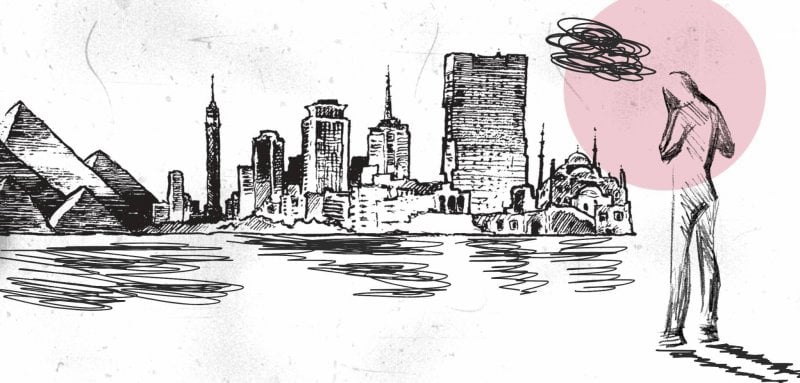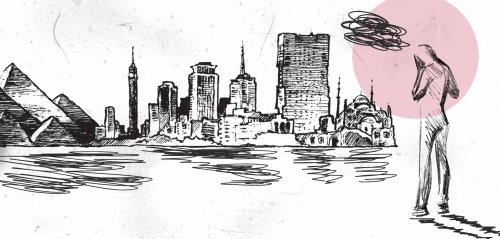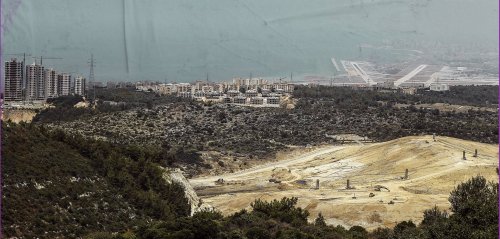Noise has become an essential feature in most of the governorates of Egypt. As soon as you find yourself in the city of Cairo, loud noises follow you from every nook and corner, whether it’s day or night. The sounds of workshops, factories and the railway, along with car horns and loudspeakers at street weddings, all pierce the ears of residents and accompany them at every moment.
Ironically dubbed the ‘silent killer’ of the century, noise pollution has a serious negative impact on health, which may lead to hearing loss, in addition to other serious damages. Perhaps the greatest danger lies in our getting used to it on a daily basis without being aware of its bad effects, thinking that environmental problems are more serious.
At the same time, the measures taken to reduce noise in Egypt remain limited and short of what’s required, including the National Network for Monitoring Ambient Air Pollutants (EEAA). Citizens and experts believe that efforts should be intensified and raised to reduce noise pollution throughout the country.
Ironically dubbed the ‘silent killer’ of the century, noise pollution has a serious negative impact on health, which may lead to hearing loss and other serious damages. In Egypt, the noise level is much higher than what's allowed in residential and industrial areas
Noise is a difficult to control pollutant
Dr. Mona Kamal, former head of the National Network for Monitoring Air Pollutants, spoke to Raseef22, saying, "Noise pollution, like any other environmental pollution, imposes great harm to human health. It is a pollutant that is difficult to set a fixed standard for. For example, when talking about air pollution, an accurate percentage of carbon dioxide gas can be calculated, but for noise, which is defined as unwanted sound, the standard varies depending on the hours of the day and place, as a lecture hall is not the same as a concert hall, and the industrial zone has a special criterion other than that of the residential areas. It also varies according to the country. Egyptian society, for instance, likes loud sounds more than the societies of Northern Europe."
The spokeswoman points out that there are international legal standards for the matter according to the World Health Organization. For example, in bedrooms, noise should not exceed 35 or 40 decibels, and in hospitals it should not exceed 30 decibels."
Re-planning and raising awareness
According to the report issued in 2021 by the Ministry of Environment regarding the National Network for Monitoring Air Pollutants, the network, which has been operating since 2007, includes 38 monitoring stations distributed over the governorates of Greater Cairo (27 governorates), and the capitals of some governorates (11), with the aim of achieving the environmental goals within the sustainable development strategy for 2030. The network is also preparing a database of both populated and tourist areas, that the noise control plan and the urban planning for the new infrastructure depends on.
Kamal, a permanent undersecretary of the Ministry of Environment adds, "The network only monitors noise levels. It doesn’t reduce them. It is distributed according to industrial and residential, and mixed regions. We found that noise levels are much higher than the permissible level in all regions, and this surplus is the lowest percentage in industrial areas because it basically allows for a level of 70 decibels".
My apartment is unfortunately in a building in an area close to the market. I wake up every day to the sounds of vendors and the quarrels between them, in addition to the loudspeakers they use, which sometimes makes me flee my house to my mother's house
According to Kamal, this monitoring allows the discovery of issues and flaws in the planning, as the annual report is distributed to the responsible authorities, including the governorates, and the new planning is carried out accordingly. Thus hospitals and schools would be kept away from the main sources of noise, and it also provides suggestions to reduce noise levels and raise awareness concerning this issue.
The spokeswoman points out that most sources of noise in Egypt come from traffic. Consequently, awareness must be raised to refrain from using the horn except when absolutely necessary, and tickets should be imposed upon any violation in regards to that. And most importantly the problem must be solved from the roots by re-planning the roads, studying the nature of the surrounding areas, increasing the number of bridges, and implementing them properly with the placement of materials on the asphalt that reduce the sound of wheel friction. Moreover, high tree barriers should be planted on the roads, as they absorb about 5 decibels of the noise, isolating it and slowing its access to neighboring areas.
The environmental consultant adds, "The behavior of some individuals needs awareness and the law. For example, voices should not be raised too much at parties, and there should be insulation isolation for the noise. Many, especially those working in the field of wedding planning, think that loud voices are a sign of joy, but unfortunately they develop hearing loss with time."
Kamal points to the need for binding laws in every neighborhood, and obliging new projects to conduct environmental studies to ensure that they will not negatively affect the environment and individuals.
A danger to health
Noise has a significant negative impact on health, as it may cause hearing loss, high blood pressure, heart disease, and also has a bad effect on children.
Dr. Magdy Moussa Salib, former director of the National Center for Occupational Safety Studies and Health and Work Environment Insurance, tells Raseef22, "Noise causes disturbance and discomfort, and affects vital systems within the body, such as the brain, the nervous system, the digestive system and the heart as well, in addition to its significant effect on ears. Continued sounds and noise above the internationally permissible limits affects hearing and with time leads to deafness. It also increases sugar and fat levels and raises blood pressure. Noise has a very negative effect on children, especially young children who have sensitive and incomplete ears. Over time the brain is affected and so does the child’s psychological behavior".
Noise affects vital systems within the body, like the brain, nervous system, digestive system and the heart. Continued noise above internationally permissible limits leads to deafness over time and increases sugar and fat levels and raises blood pressure
Magdy Salib also spoke about the danger of noise at work, saying, "Noise leads to a lack of concentration at work and a decrease in rate of productivity. There are international standards inside the workplace for those who work 8 hours a day, as noise there should not exceed 85 decibels, and in the case of working for only two hours, the noise level is allowed to reach 120 decibels.”
Salib points out that noise is also accompanied by vibrations for those who work in professions that include drilling or driving buses and large machinery. Vibrations negatively affect all joints of the body, pelvic bones and muscles, and cause numbness in the nerves. These professions may lead to permanent injuries.
The Mayo Clinic website reports that the constant crying of some infants may be caused by noise, "Intense noise, movement, or visual stimuli may cause a baby to cry. Therefore, moving to a quieter place or putting the baby in his crib may work. Also, white noise, such as sound recordings of ocean waves or the monotonous sound of a fan, may help your crying baby relax."
In a study presented by Dr. Dina Abdel Aziz Fahmy at the Faculty of Law in Tanta under the title "Criminal Protection from Noise Pollution", she indicates that noise has serious effects on many aspects of health, including blood circulation, heart function, and blood pressure. It also causes disorders in the nervous system, headaches, insomnia and chronic respiratory diseases. Auditory stimuli also affect the level of glucose in the body, so diabetics respond more sensitively to noise.
"I have high blood pressure"
Perhaps the most common complaint and symptom shared among those who live near roads or workshops is headaches.
Most sources of noise in Egypt come from traffic. Therefore, awareness must be raised to stop using car horns except when absolutely necessary, and any violators should be fined. Most importantly, the problem must be solved from the roots by re-planning the roads
Mahmoud Ahmed, 34, an employee of a private company from Sharqia Governorate, tells Raseef22, "My house is located by the road. People envy me because of its good location, but the noise here never ceases. We can feel any truck or transport vehicle that passes by, in addition to accidents and the ever-occurring fights between drivers. All of this prevents my children from concentrating, and makes me wake up with a severe headache."
For her part, Dalia, 42, a teacher from Giza Governorate, says, "My apartment is unfortunately in a building in an area close to the market. I wake up every day to the sounds of vendors and the quarrels between them, in addition to the loudspeakers they use, which sometimes makes me flee my house to my mother's house.” She adds that she has recently discovered that she suffers from high blood pressure. She does not rule out that this could be due to the ongoing noise, day and night, that never stops.
Noise and the law
Among the texts criminalizing noise pollution mentioned in the aforementioned research by Dr. Dina Abdel Aziz: Article 166 of the Penal Code stipulates that anyone who intentionally causes inconvenience to others by misusing transportation vehicles shall be punished by imprisonment for a period not exceeding one year and a fine not exceeding 100 Egyptian pounds, or by either of these two penalties. Traffic Law No. 66 of 1973 imposes a fine not exceeding 50 Egyptian pounds for anyone who drives vehicles that emit noise, whether from their engine or from their exhaust.
Workshops and factories should be moved to industrial areas or cities far from residential areas
The General Shops Regulations Law No. 371 of 1956 also prohibits certain actions that cause noise pollution, and stipulates that it is not permissible in public places and shops to play music, dance or sing, or to let others do so, or possess a radio without a special license from the General Directorate of Licensing. The Labor Law of 2003 focused on securing the work environment and obligating establishments to provide means of occupational safety and health.
Suggested solutions
Speaking to Raseef22, environmental expert Dr. Abbas Sharaky provides tips to reduce audio pollutants. These tips include activating the law and the work of local administrations, imposing penalties to anyone who does not follow the law and uses loudspeakers and horns continuously, implementing awareness campaigns to inform citizens about the danger of sound pollutants, in addition to the need for the state to take measures to reduce traffic. He also suggests taking preventive measures by various institutions to reduce noise, such as halls, factories, and others.
Dr. Mona Kamal also advised moving workshops and factories to industrial areas or cities far from residential areas, adding, "The most important measure to reduce noise is through good planning of facilities and roads. There shouldn’t be mixed areas that include both factories and homes. When building schools or hospitals, there should be sufficient spaces surrounding them to keep them away from any noise pollutants."
Raseef22 is a not for profit entity. Our focus is on quality journalism. Every contribution to the NasRaseef membership goes directly towards journalism production. We stand independent, not accepting corporate sponsorships, sponsored content or political funding.
Support our mission to keep Raseef22 available to all readers by clicking here!
Interested in writing with us? Check our pitch process here!









